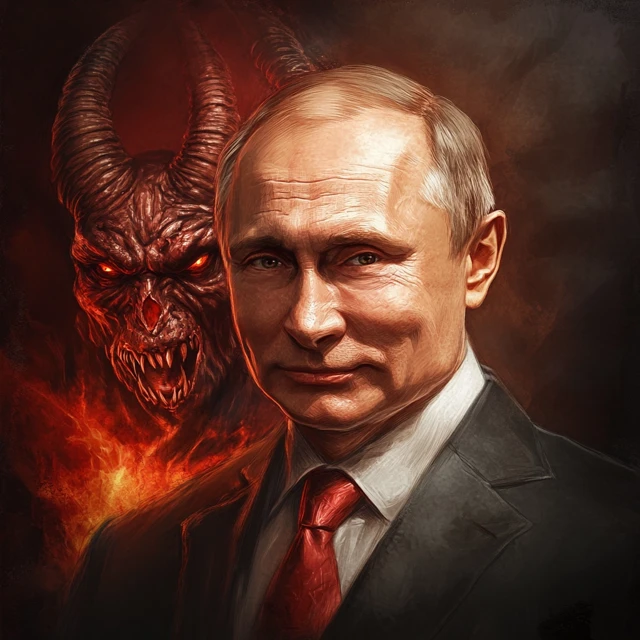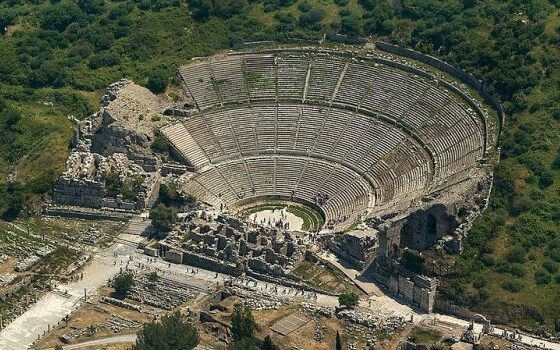The Hidden Hands: Examining Global Conflicts Through the Lens of Elite Manipulation
As I sit here, sipping my morning coffee and scrolling through the latest headlines about the Russia-Ukraine conflict, I can’t help but feel a sense of déjà vu. The narrative seems all too familiar – a powerful nation invading a smaller one, claims of liberation and security, global outrage, and economic sanctions. But something doesn’t quite add up.
It reminds me of a documentary I watched recently, “JFK to 9/11: Everything Is A Rich Man’s Trick.” Now, I know what you’re thinking – here we go, another conspiracy theory. But bear with me. This isn’t about believing every alternative narrative out there. It’s about asking questions, looking beyond the surface, and considering perspectives that might make us uncomfortable.
The Lens of Elite Manipulation
The core premise of the documentary is that major world events, from the assassination of JFK to the 9/11 attacks, have been orchestrated or manipulated by a small group of elites for their own gain. It’s a provocative idea, one that challenges our understanding of history and current events.
- Power Concentration: The documentary suggests that a small group of extremely wealthy and influential individuals, often referred to as “elites,” have disproportionate control over world events. This group is said to include powerful bankers, industrialists, and political figures.
- Historical Manipulation: According to this theory, many significant historical events that shaped the 20th and early 21st centuries were not random occurrences or the result of broad societal forces, but carefully orchestrated actions by these elites.
- Profit Motive: The documentary argues that the primary motivation for manipulating world events is financial gain. Wars, economic crises, and political upheavals are seen as opportunities for the elites to increase their wealth and power.
- Covert Operations: The theory posits that intelligence agencies, particularly the CIA, often act as tools of these elites, carrying out covert operations that serve their interests rather than national security.
- Media Control: A key aspect of this theory is the idea that mainstream media is largely controlled by the same elites, allowing them to shape public perception and maintain their power.
- Continuity of Agenda: The documentary suggests that there’s a continuous thread linking events from the JFK assassination to 9/11, implying a long-term strategy by the elites.
- False Flag Operations: Many events traditionally viewed as attacks on the U.S. are reinterpreted as “false flag” operations, designed to manipulate public opinion and justify pre-planned political actions.
- Challenge to Democracy: This perspective fundamentally challenges the idea of democratic governance, suggesting that elected officials are often just figureheads, with real power residing in unelected, wealthy individuals.
- Reinterpretation of History: The documentary encourages viewers to reexamine historical events, looking for patterns and connections that might reveal the hidden hand of elite manipulation.
- Conspiracy as Norm: Rather than viewing conspiracy theories as fringe ideas, this perspective suggests that conspiracy (in the sense of secretive planning by powerful groups) is a standard operating procedure in global affairs.
This premise is highly controversial and disputed by mainstream historians and political scientists. However, it resonates with many people who feel disenfranchised by traditional power structures and seek alternative explanations for complex global events.
Hitler’s Rise: Backed by the Elite

One of the most provocative claims in the documentary is that Adolf Hitler’s ascent to power was not solely due to his political maneuvering or public appeal, but was significantly facilitated by financial and political support from wealthy elites, both within Germany and internationally.
According to this perspective, powerful industrialists, bankers, and business leaders saw in Hitler an opportunity to advance their own interests. They viewed him as a strongman who could suppress communist and socialist movements, which they perceived as threats to their wealth and power. Moreover, they believed Hitler’s aggressive nationalism could create economic opportunities through rearmament and expansion.
The documentary suggests that this elite support manifested in several ways:
- Financial backing: Wealthy industrialists like Fritz Thyssen and Emil Kirdorf allegedly provided substantial funding to the Nazi Party, enabling its rapid growth and sophisticated propaganda campaigns. German tanks were powered by Ford engines, planes by American oil and the german soldiers were rationed with Coca Cola.
- Political maneuvering: Conservative politicians and business leaders reportedly used their influence to advocate for Hitler’s appointment as Chancellor, despite his party never winning an outright majority in free elections.
- International support: The film claims that some American and British business interests, seeing Hitler as a bulwark against communism, provided financial support and positive media coverage.
- Overlooking extremism: These elites, the documentary argues, were willing to overlook or downplay Hitler’s more extreme views and actions, believing they could control him once in power.
This narrative challenges the conventional view of Hitler’s rise as a purely populist movement. Instead, it paints a picture of cynical manipulation by wealthy elites who saw in Hitler a useful tool for maintaining their own power and expanding their wealth, regardless of the catastrophic consequences for millions of people.
It’s important to note that while there is historical evidence of some elite support for Hitler, the extent and impact of this support is debated among historians. The documentary’s interpretation represents a particular perspective on these complex historical events.
As I’ve reflected on this concept, I’ve found myself applying this lens to the current Russia-Ukraine conflict. And let me tell you, it’s opened up a whole can of worms.
A Brief History of Manipulation
Before we dive into the conflict, let’s take a step back and look at some historical examples the documentary presents. The assassination of JFK, for instance, is portrayed not as the act of a lone gunman, but as a carefully orchestrated plot by powerful individuals who saw Kennedy as a threat to their interests.
The Vietnam War is another example. The documentary suggests that the conflict was prolonged not for any strategic military purpose, but because it was immensely profitable for certain corporations and individuals.
And then there’s 9/11, perhaps the most controversial of all. The film argues that the attacks were not just a terrorist act, but a false flag operation designed to justify military interventions in the Middle East.
Now, I’m not here to argue for or against these specific claims. What interests me is the pattern they suggest – a pattern of elite manipulation of global events for personal gain.
There are compelling arguments for the rise of the Robber Barons and their guiding hand through the millennia. The idea that a small group of powerful individuals have been shaping world events from behind the scenes is not new. From the Medici family in Renaissance Italy to the modern-day tech billionaires, history is replete with examples of wealthy elites wielding outsized influence.
However, the reality is far more complex and nuanced than any straightforward conspiracy theory can capture. The world is a vast, interconnected system of competing interests, shifting alliances, and unforeseen consequences. While it’s tempting to see a grand design behind every major event, the truth is often messier and more chaotic.
This complexity makes it incredibly difficult to discern what is real and what is not. And perhaps that’s the point. The smoke and mirrors, hiding in plain sight, create a landscape where truth becomes elusive. Conspiracy theorists debate various theories, each more outlandish than the last, while the real agenda – if there is one – continues unnoticed.
This confusion serves a purpose. By muddying the waters with countless competing narratives, those in power can operate with less scrutiny. The public becomes so overwhelmed with conflicting information that they struggle to focus on any one issue for long.
Meanwhile, certain constants remain. Wealth continues to concentrate at the top. Wars are fought, often in resource-rich regions. New technologies emerge that reshape society, usually to the benefit of their creators. These trends persist regardless of which particular conspiracy theory is in vogue at any given moment.
So while we may never know the full truth behind events like JFK’s assassination or 9/11, we can observe these broader patterns. The challenge lies in maintaining a critical eye without falling into paranoia or cynicism. We must strive to see through the smoke and mirrors, to question not just the official narratives, but also the alternative ones that claim to have all the answers.
In the end, the most insidious conspiracy might be the one that keeps us endlessly debating conspiracies, distracting us from the very real concentrations of power and wealth that shape our world every day.
The Mechanics of Manipulation
So, how does this manipulation supposedly work? The documentary outlines several key mechanisms:
- Economic Incentives: War, conflict, and crisis can be incredibly profitable for certain industries. The military-industrial complex, for instance, thrives on conflict.
- Media Control: By controlling the narrative, elites can shape public opinion and justify actions that might otherwise be questioned.
- Political Influence: Through lobbying, campaign contributions, and other means, wealthy individuals and corporations can influence policy-making to serve their interests.
As I consider these mechanisms, I can’t help but see parallels in our current world. The concentration of media ownership, the revolving door between government and big business, the influence of money in politics – it all fits the pattern.
The Russia-Ukraine Conflict: A New Perspective
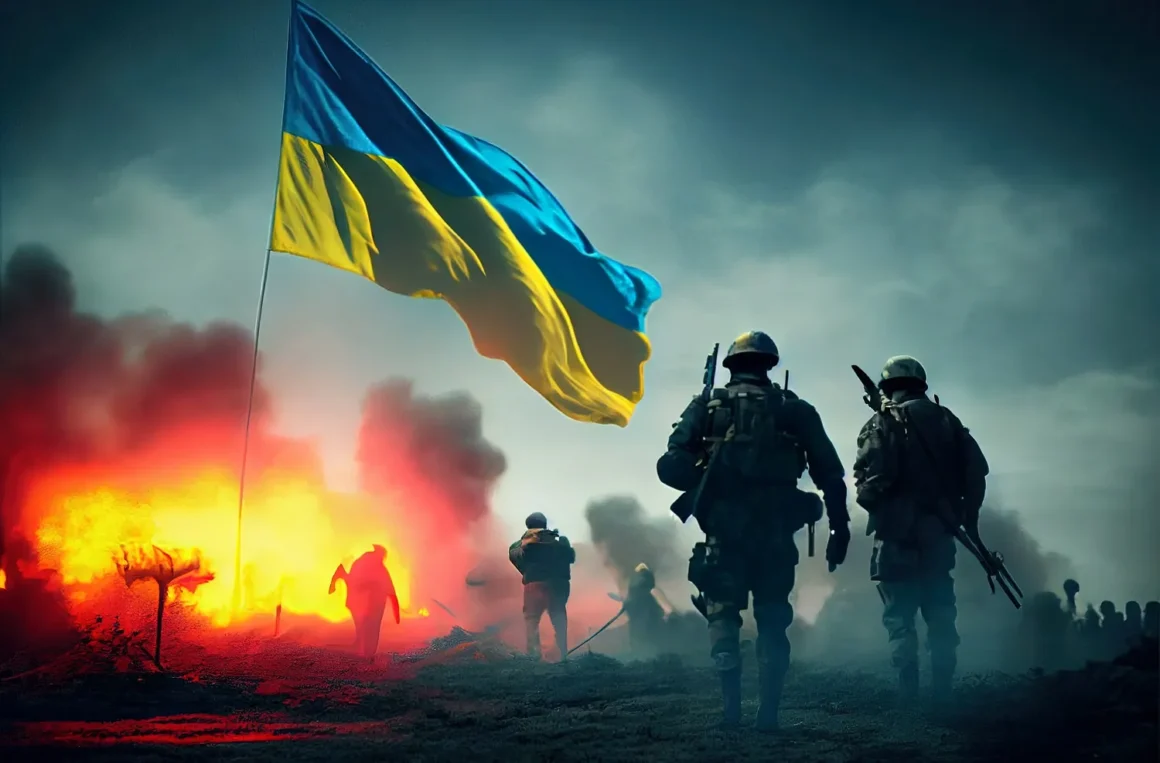
Which brings us to the current conflict in Ukraine. When Russia first invaded, the narrative was clear – a three-day operation to secure Russian interests and rid the country of Nazis. Fast forward several years, and we’re looking at a prolonged conflict that’s draining Russia’s resources and facing global condemnation.
On the surface, it doesn’t make sense. Putin is many things, but he’s not stupid. He must have known the potential consequences of a prolonged conflict. So why persist? Why not pull out?
Applying the lens of elite manipulation, some interesting questions emerge:
- Who benefits from a prolonged conflict?
- How does this conflict reshape global economic and political structures?
- What narratives are being reinforced or challenged?
Follow the Money
As always, if we want to understand what’s really going on, we need to follow the money. So, who’s profiting from this conflict?
The obvious answer is the military-industrial complex. Arms manufacturers are seeing a boom in orders as countries rush to support Ukraine and bolster their own defenses. Let’s look at some specifics:
- Lockheed Martin’s stock price has increased by over 25% since the conflict began. In 2023, they reported a 7.1% increase in net sales, reaching $67.6 billion.
- Raytheon Technologies saw a 10% rise in sales in 2023, with their missile and defense segment growing by 15%.
- Northrop Grumman’s stock has climbed by about 20% since the war started. They reported a 7% increase in sales for 2023, with their space systems segment growing by 11%.
- BAE Systems, Europe’s largest defense contractor, saw a 57% increase in its order backlog in 2023, reaching a record £58.9 billion.
But it’s not just weapons manufacturers. The energy sector is another big player. With sanctions on Russian oil and gas, other producers are stepping in to fill the gap:
- U.S. liquefied natural gas (LNG) exports to Europe have surged. In 2023, the U.S. became the world’s largest LNG exporter, with exports increasing by 15% compared to 2022.
- Cheniere Energy, the largest U.S. LNG exporter, saw its stock price double since the start of the conflict.
- ExxonMobil reported its highest-ever annual profit of $55.7 billion in 2022, with Q4 2023 earnings reaching $7.63 billion.
- Shell’s adjusted earnings hit $39.9 billion in 2022, the highest in its 115-year history.
Then there’s the financial sector. Economic turmoil always creates opportunities for those with the resources to capitalize on them:
- Goldman Sachs reported a 51% increase in fixed income trading revenue in Q1 2023, largely due to market volatility.
- JPMorgan Chase saw a 26% increase in trading revenue in Q1 2023.
- Hedge funds specializing in macro strategies, which bet on broad economic trends, saw returns of 8.2% in 2022, significantly outperforming the broader market.
As the ruble plummets and markets fluctuate, savvy investors (or those with inside information) can make a killing. For instance:
- Some commodity trading firms have reported record profits. Glencore’s 2022 profit more than doubled to $17.3 billion.
- Trafigura, another major commodities trader, reported a net profit of $7 billion for its 2022 fiscal year, more than double the previous year.
Even sectors not directly related to the conflict are finding ways to profit:
- Cybersecurity firms have seen increased demand. Palo Alto Networks, for example, saw its stock price increase by over 40% since the start of the conflict.
- Companies providing satellite imagery and intelligence, like Maxar Technologies, have also seen significant stock price increases.
The economic impacts of the conflict ripple far beyond the immediate theater of war, creating winners and losers across various sectors of the global economy.
Who stands to gain the most from this chaos?
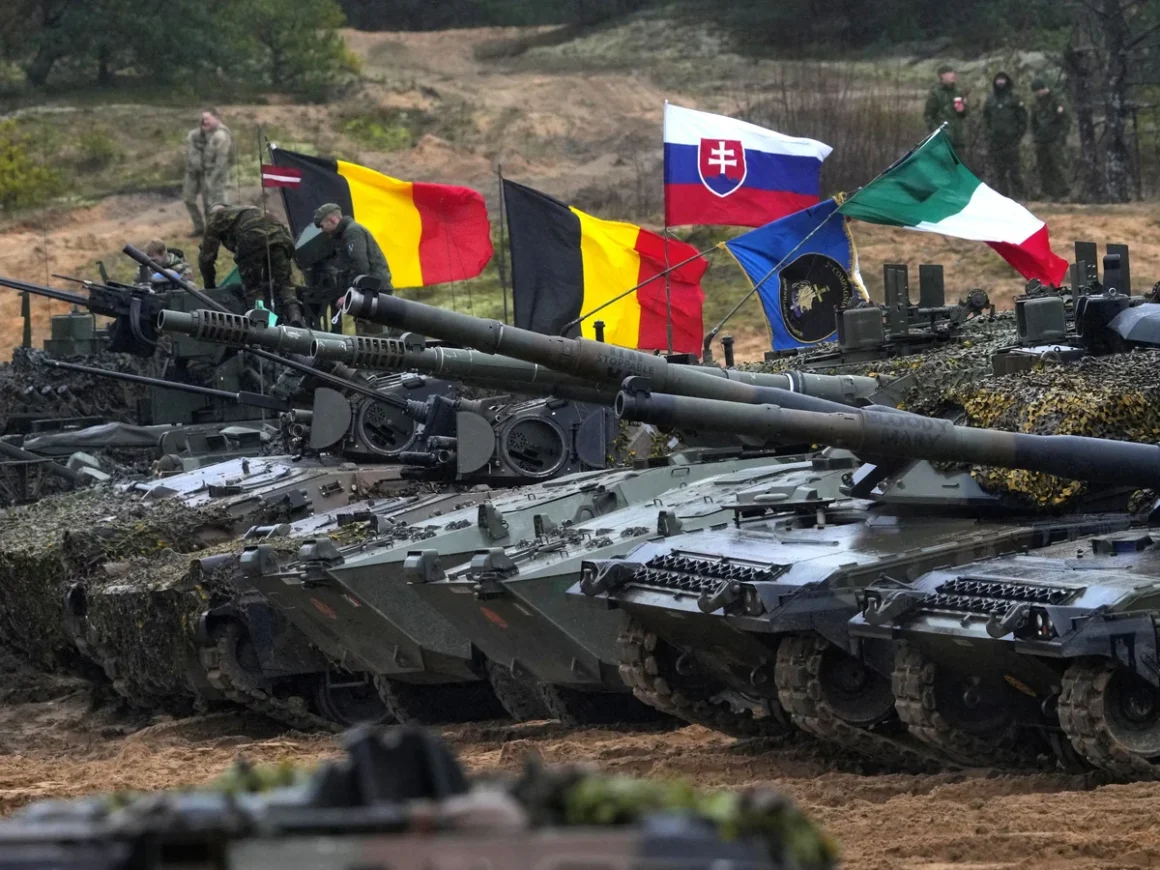
As we delve deeper into the complexities of the Russia-Ukraine conflict, a troubling question emerges: Who stands to gain the most from this chaos? It’s a cynical perspective, perhaps, but one that we must consider if we’re to understand the full picture.
NATO, surprisingly, appears to be one of the biggest winners. The alliance, which some had previously dismissed as obsolete, has found new purpose and vigor. Its relevance has been reaffirmed, unity among member states strengthened, and we’ve seen significant increases in defense spending across Europe. Finland has already joined, with Sweden likely to follow, expanding NATO’s reach and influence. This revitalization of NATO serves as a stark reminder of how conflict can breathe new life into military alliances.
The military-industrial complex, unsurprisingly, is another major beneficiary. Arms manufacturers are seeing a boom in orders as countries rush to support Ukraine and bolster their own defenses. Companies like Lockheed Martin, Raytheon, and Northrop Grumman have seen their stock prices soar. It’s a grim reality that war and the threat of war are good for business in this sector.
The United States, while not a direct participant in the conflict, has also seen strategic benefits. Its leadership role in NATO has been reinforced, and transatlantic ties have been strengthened. Economically, it’s benefiting from increased arms sales and energy exports to Europe. Perhaps most significantly, it’s seeing a major geopolitical rival, Russia, weakened without direct military involvement. It’s a strategic win that comes at a terrible human cost to those on the ground in Ukraine.
Energy companies, particularly those outside of Russia, are another group reaping benefits from this conflict. With sanctions on Russian oil and gas, other producers are stepping in to fill the gap. U.S. liquefied natural gas exports to Europe have surged, and energy companies are reporting record profits. It’s a stark reminder of how geopolitical crises can reshape global energy markets.
As we consider these “winners,” it’s crucial to remember the devastating human toll of this conflict. The Ukrainian people, bearing the brunt of the violence and destruction, are the clear losers in this scenario. The global economy, food security, and international stability have all been negatively impacted. It’s a sobering reminder that in the game of geopolitics, the gains of the powerful often come at the expense of the vulnerable.
This analysis paints a troubling picture of the forces at play in global conflicts. It suggests that behind the rhetoric of security and democracy, there are powerful entities that stand to benefit from ongoing instability and conflict. As we navigate these complex issues, we must remain vigilant and critical, always questioning whose interests are truly being served by the actions of global powers.
Putin: Puppet or Player?
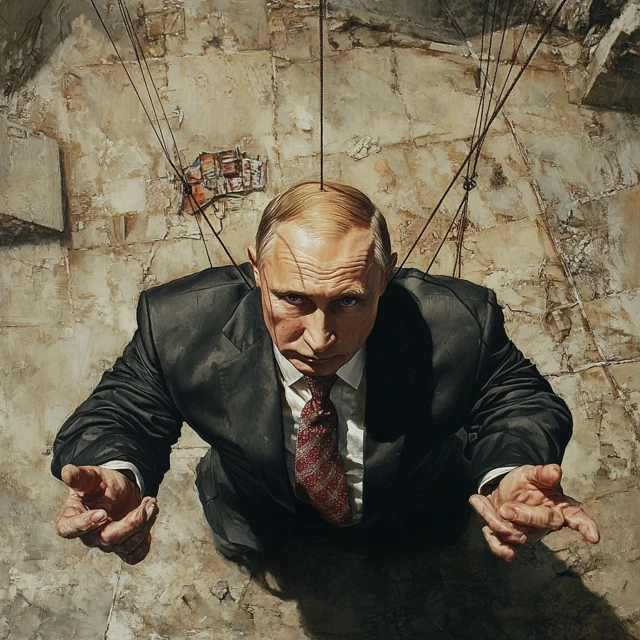
Now, here’s where it gets really interesting. If we accept the premise that global events are manipulated by elites, where does that leave Putin? Is he a willing participant in this game, or is he being played?
The idea of Putin as a puppet might seem far-fetched. After all, he’s often portrayed as the ultimate strongman, answering to no one. But power structures are complex, and even the most powerful leaders are constrained by various interests and influences.
Could Putin be acting on behalf of Russian oligarchs who stand to benefit from the conflict? Or is he unknowingly serving the interests of global elites who profit from the chaos?
Another possibility is the concept of “controlled opposition.” This is the idea that those in power allow (or even encourage) a certain level of opposition to maintain the illusion of democracy or conflict, while still ultimately controlling the outcome.
In this scenario, Putin’s Russia serves as a convenient boogeyman for the West, justifying military spending, distracting from domestic issues, and reinforcing certain geopolitical narratives.
The Global Chessboard
Zooming out, we can see how this conflict is reshaping the global chessboard. NATO is strengthened and expanding. The EU is more united than it’s been in years. Russia is increasingly isolated, pushing it closer to China.
Meanwhile, the global economy is being reshaped. Supply chains are shifting. New trade agreements are being forged. And all the while, wealth is being consolidated among those best positioned to weather (and profit from) the storm.
It’s like a giant game of Risk, with real countries and real lives as the game pieces.
If there is so much to gain for the West, and there is so much harm to Russia why would Putin simply not stop?
Russia was doing well before this invasion, it seems like the actions of a man who has lost his mind. What could possibly be the upside?
How do we make sense of the seemingly irrational nature of Russia’s invasion of Ukraine, given the severe consequences for Russia and apparent benefits for the West.
Putin’s decision to invade Ukraine does indeed appear counterproductive on many levels. Russia has suffered significant losses in terms of military personnel, equipment, economic stability, and international standing. Meanwhile, NATO has been reinvigorated, Western alliances strengthened, and Russia has become increasingly isolated. This begs the question: why doesn’t Putin simply stop the war?
There are several potential explanations to consider:
- Ideological motivation: Putin has long held a vision of restoring Russian greatness and reuniting what he sees as historically Russian lands. His statements about Ukraine not being a real country and his references to historical Russian figures suggest a deeply held belief that this war is necessary for Russia’s destiny.
- Domestic political considerations: Putin has staked his reputation and legitimacy on this war. Backing down without achieving clear objectives could be seen as a sign of weakness, potentially threatening his hold on power.
- Miscalculation: Putin may have genuinely believed the invasion would be quick and successful, with limited Western response. Having committed to this course, he may feel unable to retreat without losing face.
- Information bubble: There’s a possibility that Putin is not receiving accurate information about the war’s progress or its impact on Russia, leading to poor decision-making.
- Long-term strategic thinking: Putin may believe that in the long run, this conflict will weaken the West’s resolve and unity, eventually leading to a more favorable geopolitical situation for Russia.
- Personal legacy: As he ages, Putin may be increasingly concerned with how history will remember him, driving him to take bold, if risky, actions.
- Perceived existential threat: Putin may genuinely believe that a Western-aligned Ukraine poses an existential threat to Russia, making the war a necessary defensive action in his mind.
- Sunk cost fallacy: Having invested so much in the war, Putin may be reluctant to stop without achieving some form of victory, even if continuing is objectively harmful.
It’s important to note that from an outside perspective, these reasons may seem illogical or based on flawed assumptions. However, they may make sense within Putin’s worldview and the political realities of his regime.
The apparent lack of a clear upside for Russia in this conflict highlights the complex nature of international relations and the sometimes unpredictable nature of authoritarian decision-making. It serves as a reminder that not all global actors operate based on the same rational calculations we might expect, and that personal ideology, domestic politics, and historical grievances can play a significant role in shaping world events.
The Power of Narrative

One of the most powerful tools in the elite manipulation playbook is control of the narrative. And in the age of information (and disinformation), this has never been more important.
The mainstream narrative about the Russia-Ukraine conflict is clear and consistent across Western media. Russia is the aggressor. Ukraine is the valiant underdog. The West must support Ukraine to defend democracy and the international order.
Now, I’m not saying this narrative is false. But it is simplified, and it does serve certain interests. It justifies arms sales to Ukraine. It rallies public support for economic measures that are costly to average citizens. It distracts from domestic issues in many Western countries.
Meanwhile, alternative viewpoints are often dismissed as Russian propaganda. The result is a narrowing of acceptable discourse, making it harder to question the official narrative or consider alternative perspectives.
The Big Picture
As I’ve delved into this topic, I’ve found myself oscillating between fascination and frustration. On one hand, examining events through this lens of elite manipulation opens up new perspectives and raises important questions. On the other hand, it can lead down a rabbit hole of speculation and paranoia.
So where does this leave us? How do we navigate a world where nothing is as it seems, where every event might be part of some grand manipulation?
I believe the key is balance. We need to question official narratives and consider alternative perspectives. But we also need to ground ourselves in facts and avoid falling into the trap of seeing conspiracies everywhere.
The Wealthness Perspective
This is where the concept of Wealthness comes in. Wealthness isn’t just about financial wealth – it’s about holistic well-being, which includes being informed and engaged citizens.
From a Wealthness perspective, here’s how I suggest approaching these complex global issues:
- Stay Informed, But Critical: Consume news from a variety of sources, including those you might disagree with. But always think critically about what you’re reading or watching.
- Follow the Money: When trying to understand an event or conflict, always ask who stands to benefit financially.
- Consider Multiple Perspectives: Try to understand all sides of an issue, even (especially) those you disagree with.
- Focus on What You Can Control: While it’s important to be informed about global events, don’t let them consume you. Focus on making positive changes in your own sphere of influence.
- Cultivate Empathy: Remember that behind every headline are real people. Cultivate empathy for those affected by conflict and crisis.
- Maintain Your Well-being: Don’t let the weight of the world’s problems impact your mental health. Balance staying informed with self-care.
Conclusion: Navigating Uncertainty
As I wrap up this exploration, I’m reminded of a quote often attributed to Mark Twain:
“It’s easier to fool people than to convince them that they have been fooled.”
Whether or not the Russia-Ukraine conflict is being manipulated by elites for their own gain, the reality is that we live in a world of immense complexity and competing interests.
The idea that a small group of elites might be pulling the strings behind global events is unsettling. It challenges our understanding of democracy, free will, and the course of history. But even if we don’t fully buy into this perspective, considering it can be a valuable exercise in critical thinking.
It encourages us to look beyond surface-level explanations, to question our assumptions, and to consider the broader implications of global events. It reminds us that the world is rarely black and white, that motivations are complex, and that things are often not as they seem.
At the same time, we must be careful not to fall into the trap of cynicism or paralysis. The world may be more complex and manipulated than we’d like to believe, but that doesn’t mean we’re powerless. By staying informed, thinking critically, and focusing on what we can control, we can navigate this uncertainty and work towards positive change.
As we continue to watch the Russia-Ukraine conflict unfold, and as we encounter future global crises, I encourage you to keep an open mind. Question the official narratives. Consider alternative perspectives. Follow the money. But also, don’t lose sight of the human element. Behind every geopolitical maneuver, every economic sanction, every military operation, are real people with real lives.
In the end, the pursuit of truth and understanding is a key part of the Wealthness journey. It’s not always comfortable, and it often raises more questions than it answers. But it’s essential for personal growth and for creating a more just and transparent world.
So, the next time you read a headline about the latest global crisis, take a moment to pause. Ask yourself: What’s really going on here? Who benefits? What don’t I know? And most importantly: How can I use this information to make a positive difference in my own life and in the world around me?
Because ultimately, while we may not be able to control the actions of global elites or the course of international conflicts, we always have control over our own responses, our own actions, and our own pursuit of truth and well-being. And that, my friends, is the essence of Wealthness.
